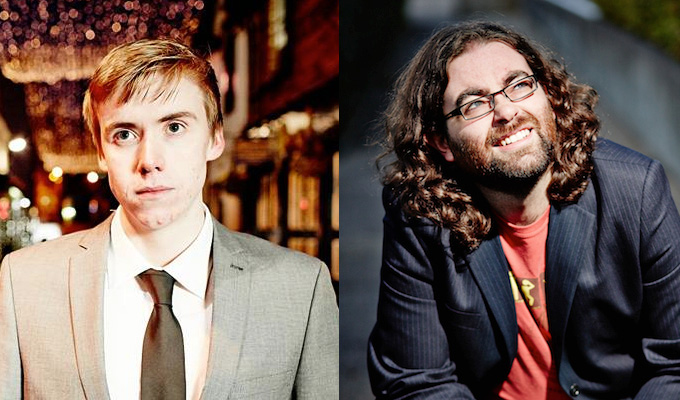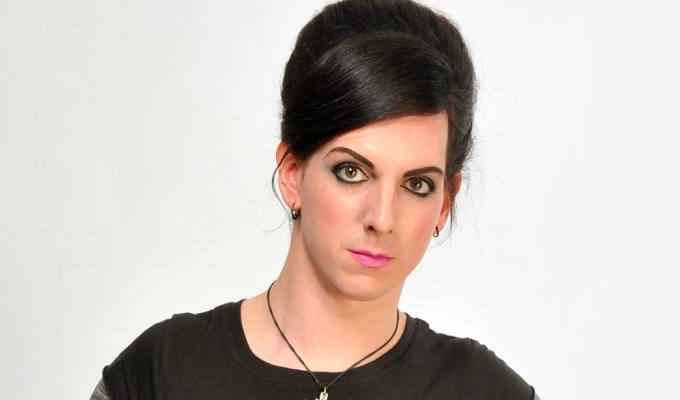
David and Keiron
Note: This review is from 2014
Glasgow Comedy Festival review by Jay Richardson
David Callaghan doesn't rely on an audience's knowledge of Kurt Vonnegut. Nevertheless, Slaughterhouse-Five is a loose inspiration and ghost in the machine of his preview. Opening with a bonus preamble of ill-sketched characters, including a (minor) time traveller, he introduces his show proper by apologetically recounting a dream he had, with the allusions and correspondences to the novel he packs into his set only adding to what's an assured half-hour of stand-up. Strikingly, he has a fresh take on airline safety films and a winningly cynical view of Martin Luther King's most famous speech.
Cocky to the point of caricature, at one point he declares a gag the best in the entire show, Kieron Nicholson's set included. Nay, the entire Glasgow Comedy Festival he corrects. 'Well done Callaghan' he congratulates himself later. 'Clever joke about Columbo' he adds in a Columbo-like aside. He's even purchased himself a prop emblazoned with one of his coinages, hoping it'll catch on.
Arguing that our sense of ourselves is invariably cherry-picked from small, selective and often quite unrepresentative memories, he dismisses comedians such as Noel Fielding, Al Murray, Jack Whitehall and, really quite viciously, Russell Brand, as cartoons, charlatans that he's on to.
The notion that we need variety, that if we all liked the same things it would be awful, is roundly rejected, as he flirts with naked fascism. And if memory is so arbitrary, then the comic is freer than anyone to shape and distort the truth as he sees fit, including the dreams of others.
This metaphysical framework running through his set is rarely foregrounded and Callaghan does an excellent job of weaving it through his apparently conventional and generally very funny routines. The stand-up itself is never an issue, and for all the playfulness with his persona, he's undeniably charismatic and witty. Still, when he finishes, you're not left admiring a coup de theatre or shaken to you inner core. Just feeling a bit cheated, wondering 'so what?'
Nicholson is more philosophical in the everyday sense, wry, relaxed and describing himself as more of an educator than a comic. A running gag is a book of Sad Maths he dips into every now and then, old school sums solved like First World, 21st Century problems.
Ironically, for somebody who craved a mentor growing up but envisages a very funny coda to the Obi-Wan Kenobi and Luke Sykwalker relationship, he does project a kind of wisdom. I'm not sure if I buy his argument on the fundamental difference between Pixar and Disney films. But there's something in the darkness of the former that he alights on, even if it's just for a mocking analysis of Finding Nemo.
Plenty of comics have sought to exploit iPod owners guilt about the terrible conditions in Apple's Chinese factories. But Nicholson artfully zeroes in on the inhumane subtext of the language that justifies suicide nets. He employs a similar tactic when he receives a form about his suitability to work in a school, a strange bit of legalese prompting doubts about his own monstrous capacity.
He finishes strongly. Simply sharing the existence of Ghosthunting With Girls Aloud contains all the humour you need, which he acknowledges, but still manages to wring extra laughs from envisioning the film crew abusing the band.
And having made a BBC Radio Scotland mini-series about his backpacking adventures, he saves the absolute best for last. Again, simply planting the idea of the chance to machine gun a chicken in Vietnam for $15 threatens to be funnier than anything he can contrive. Regardless, he pulls apart and gleefully examines the motivations of anyone prepared to enter into such a contract, before adding a possibly apocryphal and yet even more extreme example that lingers in the memory long afterwards.
Review date: 26 Mar 2014
Reviewed by: Steve Bennett






